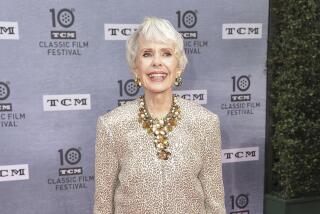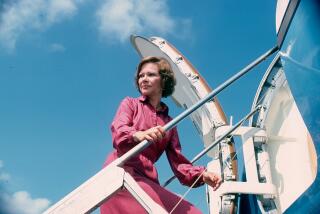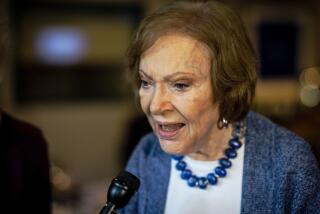Stalwart Hub of the Family : Barbara Bush: Loyal Wife Who’s Reserved, Not Shy
- Share via
WASHINGTON — In a striking pink dress, she sat placidly on a flowered chintz couch in the elegant parlor of the vice president’s mansion. But there was nothing meek or cautious or demure about the anger rising in Barbara Bush.
Her husband, the vice president of the United States, the all-but-official Republican nominee, the George of “Where was George?” may have decided to turn the other cheek to the Bush-bashing at the Democratic National Convention, but Barbara Bush would not.
Ann Richards--”that woman” is Barbara Bush’s cool description--and her biting keynote address drove the vice president’s wife away from the television set. And then came Sen. Edward M. Kennedy (D-Mass.) to raise the haunting question: “Where was George?”
“I couldn’t watch Teddy Kennedy,” Barbara Bush said, her refined upper-class inflections growing tight. “I couldn’t watch. He shouldn’t even say George Bush’s name . George is the most decent, wonderful man, caring man, good-- he shouldn’t do that!”
She is George Bush’s most stalwart defender, his wife of 43 years, mother of their five surviving children, the in-law whose strength of conviction and loyalty have made her the protector of the Bush family pride.
Her husband’s equal as a Northeastern blueblood, she shares traits that have marked him, not always flatteringly, in the political arena: an insistence on good manners, a reluctance to toot one’s own horn, a private personality that is at odds with the public one.
She is hardly, however, a docile political wife willing to follow without question George Herbert Walker Bush, the first boy who kissed her. George Bush may have decided to shrug his shoulders at the gibes from the Democrats, but his wife is unable and unwilling to set aside what she perceives as personal insults.
She can be raucous and witty, warm and regal, occasionally imperious or, if the mood strikes her, downright hot-blooded. She is an unapologetic woman’s woman who has, she very deliberately says, chosen to embrace her life.
“I really love my life, but I could have chosen not to like it,” she said. “I chose to like it.”
The campaign calls her its “secret weapon.” Her children offer emotional, heart-warming praise. Only Barbara Bush points the stiletto at Barbara Bush and lets it jab.
To hear her tell it, she is 13 years into her second life, having flowered into her present personality after the children were out of the house and events conspired to broaden her perspectives and--she says with typical self-deprecation--”the sleeping brain awakened.”
She is 63 years old, born into a social class in which women were defined first by their fathers and then by their husbands, into a generation of women reared with limited options. The options have changed and, with them, Barbara Bush, but not without some doing.
Opportunities Unexpected
She certainly never expected this--to be sitting in a Victorian mansion pondering the home stretch of the presidential derby--not when she was 16 and fell for a skinny boy with the most beautiful face she had ever seen.
“At this stage of life, I thought I’d be dead, of course,” she cracked. “I mean, nobody ever lived to be this age.”
Barbara Pierce, daughter of the publisher of McCall’s magazine, met George Bush at a teen-agers’ dance nearly half a century ago, and her eyes shine still at the memory. He couldn’t waltz, so they sat and talked. A few meetings later, their engagement was all but official. When George Bush returned from World War II service in the Navy, they were married and Barbara Bush dropped out of Smith College as a 19-year-old sophomore.
She portrays that Barbara Bush as a passive, sheltered girl overwhelmed by two strong women--her mother and her mother-in-law.
‘Never Bought a Thing’
“I remember I never bought a thing by myself,” she said. “My mother and my sister bought everything and told me, ‘This would be nice for you.’ ”
“And after I was married. . . I went off and bought a tweed suit, brought it home to show my mother and Mrs. Bush my first purchase, and they both said, they said, ‘Well, no hem, Dear, and the color--so drab.’ And whatever. ‘It’s cheap, Dear.’ ”
She recalls the conversation with a smile, with not a trace of resentment. “Well, I think I kept it and hated it from then on. . . . I really was a late bloomer, in all honesty.”
That was not, however, what others saw.
Otha Taylor was the afternoon baby-sitter at the Bush home in 1956, when the family lived in Midland, Tex. At the time, the Bushes also employed a morning maid.
Taylor recollects a strong, no-nonsense Barbara Bush. During her tenure, Taylor said, Barbara Bush, three of the Bush children and the two employees--who are black--drove in the family’s brand-new station wagon from Texas to the Bush family compound in Maine. George Bush and the couple’s eldest son, also named George, flew there later to meet them.
Hotels Not for Blacks
The Bushes had made reservations at hotels along the way. They were not aware, until they reached Oklahoma City the first night, that the hotels they had chosen would not accommodate blacks.
“She came out and told us the manager didn’t want us to stay there,” Taylor recalled.
“We explained to her this would be all right, she could let us get a motel or something in the black neighborhood. She said no.”
The hotel finally relented and let the women stay. Otha Taylor recalls Barbara Bush fighting the same battle at each stop--pressuring hotel clerks, changing reservations, refusing to split up the group.
“She insisted that we were together and we were going to stay together,” Taylor said. “Sometimes she would go out (of a hotel) upset. This was all the way to Maine. She would talk to us and tell us how badly she felt. She kept us with her and she didn’t go anyplace we couldn’t go, and she didn’t live anyplace we couldn’t live.”
A Sturdy Hub
Her children also saw her as the sturdy hub of a rambunctious family, confident enough to go wherever her husband’s businesses took them.
“She was the girl from Rye, N. Y., who, with her husband and 2-year-old son, moved to West Texas--uncharted territory out in the middle of the desert--while all her buddies were probably sitting up there going to tea parties,” said George W. Bush, the eldest child, now a senior adviser to his father’s campaign.
She moved more than two dozen times, from Midland to Houston to Washington to New York, back to Washington and on to China from 1974-75, when George Bush was chief of the U.S. liaison office. China, she says, was her chrysalis, the place where she “sort of deep-delved.”
“I don’t mean to say I didn’t do a lot of things before, but I was always a nice little follower,” she said. In China, she immersed herself in history and art. When the Bushes came home to the United States, she traveled the country with a slide show on China--a country still virtually closed to Americans at that time.
“I think it just taught me that I could be good,” she said proudly. “I don’t think that I was not confident before, but I would say that I was, you know, a C-plus in confidence. I was perfectly happy to live in my own little family spot.”
Ultimate Outspokenness
Her son George sees her China experience as having paved the way for her ultimate outspokenness on topics such as eradicating illiteracy, an effort she has supported actively for 10 years.
“Prior to going to China I think there were some pressures among her age group, her buddies and stuff, that maybe being just a housewife and a mother isn’t enough,” he said.
“I think Mother began to sense that a little bit. When she got back from China, not only had she been there basically alone with the man she loves for a long period of time . . . but she all of a sudden began to realize that outside the home, she had a skill.”
To her friends, all the talk about a personality change in China is a bit bewildering.
Janet Steiger’s husband, Bill, came to Congress in January, 1967, as did George Bush. Janet Steiger, now chairwoman of the U.S. Postal Rate Commission, says that Barbara Bush was always “a standout.”
“She’s been the center that allowed all of this to happen,” Steiger said.
Death of Daughter
The center can be shaken. In 1953, the Bushes’ 3-year-old daughter, Robin, turned listless. Her problem was diagnosed as acute leukemia. She died a few months later.
“The agony . . . is still there in her voice when she talks,” Steiger said.
Barbara Bush does not dwell publicly on the loss, regardless of pressure to personalize her public image and her husband’s. In an interview it is only a sad, unspoken prologue to mention of another daunting occurrence, the critical illness of her youngest son, Marvin, now 31. In May, 1986, he underwent emergency surgery after losing a substantial amount of blood in an attack of ulcerative colitis.
She grows pale at a brief reference to his illness. “It was an enormous shock that we might lose Marvin,” she said quietly. “Enormous.”
It was also an occasion, she said, that jolted the publicly reticent Bushes into showing more affection in private.
Rare Displays of Affection
“I’m a feeler and I think George is a feeler too,” she said, “but I’m not one who wears--I like to kiss in private my husband. . . . I’m embarrassed by people who put on a whole kind of lovey-dovey.”
Neither the illness nor the campaigning has served to make public displays of affection between the senior Bushes less rare. They infrequently hold hands in public. He occasionally will throw an arm around the woman he calls “Bar.” Their son George says that will not change, even with the contrast this election year between them and the openly emotional Dukakis clan.
“They’re just not into showing off in public,” he said.
Barbara Bush describes her relationship with George as close to osmosis: He knows what she thinks and she what he thinks, so much so that he never asked her what she thought about his running for President before he made the first try in 1980.
“Did he ever ask? I think--you know, he never asked me to marry him exactly, so you know about some things. I knew he was going to run for President. I don’t think he asked me in ’78. I think he may have said, ‘I’m running for President. What do you think?’ . . . You should recall the day your husband proposed or the day he told you he’s going to run for President. I don’t have it down as a red-letter day.”
Her image has her playing a passive role, the ever-present mate in a trim suit or a feminine dress, a string of pearls or a gold vice presidential pin at her neck, standing behind him in victory and defeat. Barbara Bush will even play along with that image--to a point.
She has asked her husband not to tell her the name of his vice presidential running mate.
“I don’t want to leak it,” she said. “I don’t want to giggle or do the wrong thing and, anyway, it’s sort of fun. You know, today you can find out what (sex) your baby is (before birth)? I don’t want to know what my baby is before, I want to be surprised . I hope I’m not shocked .”
But would she be likely to offer a recommendation?
“Sure! Sure,” she said. Then she added a pointed rejoinder: “Who’s to say I haven’t?”
Loves Issues
Immersed in politics by her marriage, Barbara Bush makes it a point to sit in on the vice president’s issue sessions. “But I love all the housing and the homeless and child care. I love all that. I’m interested. I love education,” she said.
Just how much sway she has over her husband is in dispute. She will take some credit, for example, for bringing the issue of education to his attention, but she insists that her influence is limited. She has emphasized that she supports gun control legislation, while he opposes it.
Others say her influence is underestimated. An aide recalls Bush walking into his office and advocating trips to particular locations because “Bar tells me I’ve got to do this.”
Back Channel to Husband
Aides also have used the vice president’s wife as a back channel to him when it would have been impolitic to use the campaign chain of command. It is a measure of her perceived influence that her opinions are often feared by Bush aides.
She has been reluctant to voice her views in public, however, especially since a 1984 embarrassment.
Chatting then with reporters on a campaign plane, Barbara Bush was needled about the family’s wealth. She retorted that the family of her husband’s counterpart in that campaign, Democratic vice presidential candidate Geraldine A. Ferraro, was in fact richer than the Bushes. She added that she and her husband had no intention of obscuring their wealth--”not like that 4-million-dollar--I can’t say it, but it rhymes with rich.”
Barbara Bush insisted then and now that she believed the comment was made in private.
This year, the rigors of the campaign have included personal ribbing. On “Saturday Night Live,” for example, she was satirized as her youthful-looking husband’s mother. She is in fact a year younger than George.
‘We All Are Vulnerable’
“She’s used to it now,” her son Marvin said, “but . . . we all are vulnerable. I don’t think anybody likes to be accused of looking like (her husband’s) mother. She’s handled that extraordinarily well. It upsets me. She’s got a tough job ahead of her. She’s not running for President and people are going to judge her.”
Barbara Bush thinks herself ready. She has, she says with pride, talked to a million people in the last seven years.
“That would have had me in a panic before. It doesn’t scare me anymore.”
Ask Barbara Bush if she now considers herself a strong character, and she will vacillate. But not for long.
“Well, you lose your own image because people tell you all these horrible things,” she said. She paused. “But . . . yes.”
More to Read
Get the L.A. Times Politics newsletter
Deeply reported insights into legislation, politics and policy from Sacramento, Washington and beyond. In your inbox twice per week.
You may occasionally receive promotional content from the Los Angeles Times.











